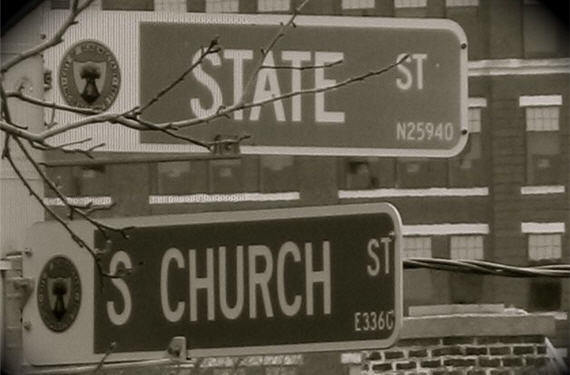It Doesn’t Matter If It’s Allah, Jesus, or Aqua Buddha: Why “Separation Of Church And State” Exists
An incident at a school in England provides us with an object lesson in why the often derided concept of separation of church and state is an important part of protecting individual liberty.
A school in England gives us a lesson in what can happen when you don’t have a Constitutional guarantee of separation of church and state:
Two schoolboys were given detention after refusing to kneel down and ‘pray to Allah’ during a religious education lesson.
Parents were outraged that the two boys from year seven (11 to 12-year-olds) were punished for not wanting to take part in the practical demonstration of how Allah is worshipped.
They said forcing their children to take part in the exercise at Alsager High School, near Stoke-on-Trent – which included wearing Muslim headgear – was a breach of their human rights.
One parent, Sharon Luinen, said: “This isn’t right, it’s taking things too far.
“I understand that they have to learn about other religions. I can live with that but it is taking it a step too far to be punished because they wouldn’t join in Muslim prayer.
“Making them pray to Allah, who isn’t who they worship, is wrong and what got me is that they were told they were being disrespectful.
“I don’t want this to look as if I have a problem with the school because I am generally very happy with it.”
Another parent Karen Williams said: “I am absolutely furious my daughter was made to take part in it and I don’t find it acceptable.
“I haven’t got a problem with them teaching my child other religions and a small amount of information doesn’t do any harm.
“But not only did they have to pray, the teacher had gone into the class and made them watch a short film and then said ‘we are now going out to pray to Allah’.
“Then two boys got detention and all the other children missed their refreshment break because of the teacher.
“Not only was it forced upon them, my daughter was told off for not doing it right.
“They’d never done it before and they were supposed to do it in another language.”
“My child has been forced to pray to Allah in a school lesson.” The grandfather of one of the pupils in the class said: “It’s absolutely disgusting, there’s no other way of putting it.
The problem for these students, of course, is that the United Kingdom has no written Constitution, no written Bill of Rights, and the restraints on agents of the state from imposing religious belief or activity on others are not nearly as strict as they are in here.
In the United States, this would be not only inexcusable, but illegal thanks to the Supreme Court decision in Engle v. Vitale, where the Supreme Court declared unconstitutional the practice of New York State schools of requiring students to start out each school day by reciting a “non-denominational Christian prayer.” In that case, the Court said the following:
The Establishment Clause thus stands as an expression of principle on the part of the Founders of our Constitution that religion is too personal, too sacred, too holy, to permit its “unhallowed perversion” by a civil magistrate. Another purpose of the Establishment Clause rested upon an awareness of the historical fact that governmentally established religions and religious persecutions go hand in hand. The Founders knew that only a few years after the Book of Common Prayer became the only accepted form of religious services in the established Church of England, an Act of Uniformity was passed to compel all Englishmen to attend those services and to make it a criminal offense to conduct or attend religious gatherings of any other kind – a law which was consistently flouted by dissenting religious groups in England and which contributed to widespread persecutions of people like John Bunyan who persisted in holding “unlawful [religious] meetings . . . to the great disturbance and distraction of the good subjects of this kingdom . . . .” And they knew that similar persecutions had received the sanction of law in several of the colonies in this country soon after the establishment of official religions in those colonies. It was in large part to get completely away from this sort of systematic religious persecution that the Founders brought into being our Nation, our Constitution, and our Bill of Rights with its prohibition against any governmental establishment of religion. The New York laws officially prescribing the Regents’ prayer are inconsistent both with the purposes of the Establishment Clause and with the Establishment Clause itself.
It’s also worth quoting at length from the January 1802 letter where Jefferson used the phrase that has become a battleground:
Believing with you that religion is a matter which lies solely between man & his god, that he owes account to none other for his faith or his worship, that the legitimate powers of government reach actions only, and not opinions, I contemplate with sovereign reverence that act of the whole American people which declared that their legislature should make no law respecting an establishment of religion, or prohibiting the free exercise thereof, thus building a wall of separation between church and state. [Congress thus inhibited from acts respecting religion, and the Executive authorised only to execute their acts, I have refrained from presenting even occasional performances of devotion presented indeed legally where an Executive is the legal head of a national church, but subject here, as religious exercises only to the voluntary regulations and discipline of each respective sect.] Adhering to this expression of the supreme will of the nation in behalf of the rights of conscience, I shall see with sincere satisfaction the progress of those sentiments which tend to restore to man all his natural rights, convinced he has no natural right in opposition to his social duties.
The separation of church and state, Jefferson recognized, went both ways. It protected the church from being interfered with by the state, and it protected the state from becoming the thing that the Founders feared as much as political tyranny, a means by which the church can impose its beliefs on society as a whole at the point of a gun.
Religion, Jefferson and the other founders believed, was a wholly private matter that the state had no business being involved in. That’s why religious liberty exists, and that’s what the “separation of church and state” really means.







Nah uh! The exact words “separation of church and state” aren’t in the Constitution so it doesn’t exist. Some witch lady told me so.
I think it better to say, “and it PREVENTED the state from becoming the thing that the Founders feared as much as political tyranny, a means by which the church can impose its beliefs on society as a whole at the point of a gun.”
Though it precludes establishment of religion, it does not preclude government from protecting the free exercise of religious belief–in fact it demands that government protect it.
Though it precludes establishment of religion
The amendment covers a lot more than you state. It precludes the writing of laws “respecting an establishment of religion,” not just the establishment of religion by the state.
it does not preclude government from protecting the free exercise of religious belief–in fact it demands that government protect it.
No, it demands the government not prohibit it. There’s a difference between “protecting” the exercise of religion and not prohibiting it.
Congress shall make no law respecting an establishment of religion, or prohibiting the free exercise thereof; or abridging the freedom of speech, or of the press; or the right of the people peaceably to assemble, and to petition the Government for a redress of grievances.
The amendment prevents the government from passing laws pertaining to religion or prohibiting the exercise of religion. Any and all religion.
Of course, the witch lady was correct, the Constitution does not require separation of church and state:
“The Court has sometimes described the Religion Clauses as erecting a “wall” between church and state. The concept of a “wall” of separation is a useful figure of speech probably deriving from views of Thomas Jefferson. The metaphor has served as a reminder that the Establishment Clause forbids an established church or anything approaching it. But the metaphor itself is not a wholly accurate description of the practical aspects of the relationship that in fact exists between church and state.
No significant segment of our society, and no institution within it, can exist in a vacuum or in total or absolute isolation from all the other parts, much less from government. “It has never been thought either possible or desirable to enforce a regime of total separation. . . .” Nor does the Constitution require complete separation of church and state; it affirmatively mandates accommodation, not merely tolerance, of all religions, and forbids hostility toward any.
http://supreme.justia.com/us/465/668/case.html
No, it demands the government not prohibit it. There’s a difference between “protecting” the exercise of religion and not prohibiting it.
Would you argue the same about freedom of speech? I think not.
Would you argue the same about freedom of speech?
Well, the language of the amendment is different for speech, but the effect is quite similar.
Congress shall make no law…abridging the freedom of speech
Again, the government is not tasked with protecting freedom of speech, but is prevented from abridging it. That’s why the government doesn’t get involved if Juan Williams is fired from NPR for something he said, or if Bill Maher is fired from ABC for something he said. They both have freedom of speech, but it’s not the government’s job to protect them from facing any consequences for their speech. The government can’t abridge their freedom of speech, but their employers sure can (but really, they can’t, as you are not protected from the consequences, so your “freedom of speech” only means freedom from government intervention).
The big difference is the amendment prevents Congress from passing laws respecting an establishment of religion, but doesn’t prevent them from passing laws pertaining to speech. They just can’t pass laws that abridge speech.
So, you’re almost right about my argument, but not for the reasons you think you are.
I think I would abridge my original post by not including the “in fact it demands that government protect it.”
Agreed on language surrounding the abridgment of free speech.
I think PD Shaw accurately captures the sentiment I was attempting to communicate. Non-establishment does not mean religion should be treated as persona non grata by government.
“…it protected the state from becoming the thing that the Founders feared as much as political tyranny, a means by which the church can impose its beliefs on society as a whole at the point of a gun.”
You mean, like Sharia law???
Non-establishment does not mean religion should be treated as persona non grata by government.
No, it shouldn’t. The callous indifference argument by the SCOTUS was correct, IMO. However, the wall of separation, even if not absolutely impenetrable, still exists because of the 1st Amendment. The witch lady ain’t right.
Funny, I can’t find anything about guns in the Koran. Violent enforcement of religious laws, yes, but then again the Bible’s full of that as well.
The key words in the amendment are “Congress shall”. Notice it does not specifically or generally state State Legislatures, but Congress. Looks like under the 10th Amendment, states could establish state religion. That is a plain english reading of the document. However since lawyers have gotten their twisted agenda hands on interpretation, you can even find the RIGHT to abortion in the document. Next the the right to marry.
Yes, but the First Amendment was incorporated into being the binding law of the land, including against state legislatures, after the passage of the 14th Amendment.
The wall of separation, is between liberals and history, fact ,intent, common sense,reason, etc,etc,etc…
Mr. Gorbachev, tear down this wall between liberals and etc.!
Separation Of Church And State? Why then, here in Texas are about half of the polling places located in local churches?
***Mr. Gorbachev, tear down this wall between liberals and etc.!***
lol I try, but for every two bricks I take out they stick one between their ears and hit themselves in the head with the other…….
Speaking of walls, perhaps we could build one between liberals and the trash Heep of history.
Intelligence agency no,,happy meals no, pay check no. trash Heep yes…..
And why not a lawless invading country like MEXICO!!!!!
but I digress….
Separation of federal government and Church, hmmmmmmmmmmmmmmmmmmmmmmmmmmmmmmmmmmmmmmmmmmmmmmmmmmm, now there is an idea….
Ok, the post is about how the first ammendment protects everyone from forced religious practices by not favoring ANY religion, and backs it up with a pretty solid example of abusive authority on a religious matter and somehow the commentary comes back to justifications of why and how it could be alright as long as it is Christianity?
Is this navel gazing for the fun of it or have people really internalized the “we’re Christians, we’re different” that much?
As a follow up, cause I’m curious, who are the heretics: Quakers or the Mormons? Catholics or Baptists?
you are aware that this a) happened more than 2 years ago and b) the teacher in question was fired?
@Zelsdorf Ragshaft III :
You said: The key words in the amendment are “Congress shall”. Notice it does not specifically or generally state State Legislatures, but Congress. Looks like under the 10th Amendment, states could establish state religion. That is a plain english reading of the document. However since lawyers have gotten their twisted agenda hands on interpretation, you can even find the RIGHT to abortion in the document. Next the the right to marry.
IANAL but doesn’t the 14th Amendment take care of that? Per wikipedia.org:
Its Due Process Clause prohibits state and local governments from depriving persons (individual and corporate) of life, liberty, or property without certain steps being taken. This clause has been used to make most of the Bill of Rights applicable to the states, as well as to recognize substantive rights and procedural rights.
As for the right to abortion, I was under the impression that’s included as a part of the right to privacy…
The landmark decision, Roe v Wade relied on the 14th Amendment which guarantees that federal rights shall be applied equally to all persons born in the united States. The 14th Amendment has given rise to the doctrine of Substantive due process, which is said to guarantee various privacy rights, including the right to bodily integrity.
As for the right to marry:
I believe that has been confirmed as supported many time by various Supreme Court decisions. Ted Olson mentioned that there were 14 cases where the SC confirmed the right to marry.
Follow-up:
The right to marry is derived from the rights to liberty, privacy, association, and spirituality, as protected by the Constitution.
http://www.youtube.com/watch?v=nkU9n5GxCDk
The Constitution does not mention ‘privacy’ as a right to be protected. It is found in a court-derived extrapolation of other rights. That’s one of the reasons that Roe v. Wade is so contentious. To some, it appears that the Court created a right out of whole cloth, simply pulling it out of the ‘desired result’ magic hat.
Why would an English public school force students to pray to a God that they don’t necessarily believe in? I’m with the parents on this one: informing children of different religions is great, but requiring them to take part in the practices of religions they aren’t part of is entirely wrong.
The statement Congress shall make no laws does not deprive anyone of anything except congress. It is not a general statement it is very specific in focus. If the founders would have wanted the federal government to have that kind of power over the states they would have so stated. Read the 10th Amendment. The first ten amendments are not changeable.
Wow…
What a world of idiots… You people have been talking about the seperation of church and state… enshrined in the constitution… and yet not one of you has cited Article VI, para 3 of the Constitution… where it says:
“but no religious test shall ever be required as a qualification to any office or public trust under the United States.”
This is not an amendment, but the language in the CORE of the US Constitution.
Ya know folks, if you are going to talk about the Constitution, I would appreciate that you read the damn thing… the whole damn thing,… not just the parts you think apply to your argument.
Zelsdorf keeps harping on the 10th Amendment because he’s writing his comments with his shoes on and can’t count any higher.
yet not one of you has cited Article VI, para 3 of the Constitution
The religious test clause only applies to public officials. The 1st Amendment is for us all.
The first ten amendments are not changeable.
Oh, Zels. Such a moron.
Sigh, is it any wonder the godless Commie Chinese have been crushing us for the past 30 years while we argue about which primitive superstition our leader should grunt, whistle and click to?
We had at least one high school teacher in our local system that used the ‘separation of church and state’ argument to ban students from wearing personal items like crosses.
@Rodney –
Then that teacher is breaking the law and violating her students’ free religious exercise.
Which is why “separation of church and state” is a bad metaphor.
A girl at my kid’s public school brought to class a trophy she had received for Koran Reading, and for sharing time she showed the trophy and spoke some Arabic from the Koran.
Is that maintaining a wall between religion and state? No. Is it attempting to establish a religion? No.
@Joe, re: “Why would an English public school force students to pray to a God that they don’t necessarily believe in?”
I am beginning to wonder if the “teacher forces student to…” cases are more that the teacher has a lesson plan, tries to implement it, and when the student defies their orders, as it were, the teacher thinks they have to enforce it or otherwise face a real challenge to their authority….Sort of like a new manager who gives instructions to an employee, and when the employee balks or pushes back, and perhaps makes valid counterpoints, the manager digs in their heels more out of stubbornness and ego than out of doing the right thing.
I mean, teacher are human, so they have the same weaknesses we all do, pride….
Just throwing that out there, that sometimes people don’t want to admit they made a mistake, especially if they have to do so in front of people they are supposed to lead.
Also, I wonder if the instructions were motivated by: when you learn about a culture, you try their food, wear their “typical” clothes, speak their language…and in the case of a religion in a foreign language, you could recite a prayer or go through the motions…not “pray” their prayer, but recite…repeat orally that is…not believe it, not preach it, but just repeat it, to get a first hand experience in their culture. If they had been given a rosary and asked to use it count off the different prayers that a Catholic does, then I could see that as a parallel, but I am not Catholic at all.
I don’t think asking the kids to go through the motions in a cultural experience lesson is so bad at all, depending on how it’s presented. Of course, there’s a reasonable line to draw on how to press that experience.
@PD Shaw, re: ” girl at my kid’s public school brought to class a trophy she had received for Koran Reading, and for sharing time she showed the trophy and spoke some Arabic from the Koran. Is that maintaining a wall between religion and state? No. …”
I think the girl in this example is clearly not the State…the teacher is the State, and if the instructions had been to try to convert the classmates, well, that’s different….in this case, it was show-and-tell….not show-and-babtize (you know what I mean…). In fact, I think the teacher allowing the student to discuss their religion as part of it satisfies the separation of church and state…
True. Unfortunately its very difficult to do anything about instances like this without affecting your child’s school life, education, and grades. It didn’t happen to any of my daughters, but I found out about it from them after the fact.
Wrong. That girl is not a state employee, she’s a student. There is no violation of the separation of church and state there. If the teacher forced the children to read verses from the Koran, that’s a different story, assuming its a public school.
I’m pretty sure the ACLU’s position is that a student cannot be used to breach the so-called wall between church and state.
http://en.wikipedia.org/wiki/Santa_Fe_Independent_School_Dist._v._Doe
Which comes into play if a teacher asked a student to lead a class prayer in any religion, but not if students are asked to share something about themselves and they pick their religious beliefs.
These the same Founding Fathers who opened each and every session with a prayer?
Probably..
Some of which signed or voted for the treaty of tripoli in 1796 which says…
“As the Government of the United States of America is not, in any sense, founded on the Christian religion; as it has in itself no character of enmity against the laws, religion, or tranquility, of Mussulmen; and, as the said States never entered into any war, or act of hostility against any Mahometan nation, it is declared by the parties, that no pretext arising from religious opinions, shall ever produce an interruption of the harmony existing between the two countries.”
Two can play that game 😛